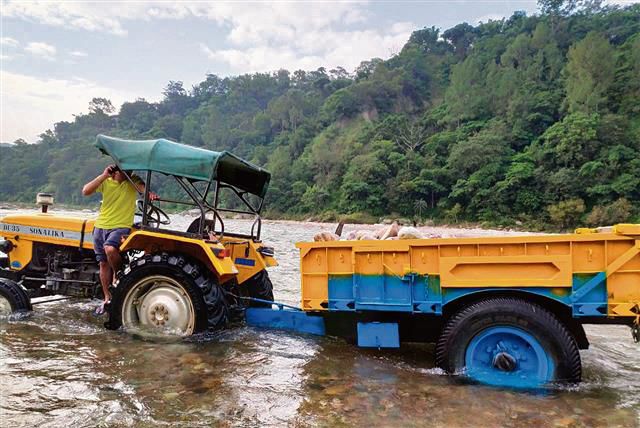
A tractor-trailer being used to remove stones from Mol khud.
Ravinder Sood
Palampur, May 9
Rampant illegal mining along the Beas has forced Mol and Mandh khuds, its tributaries, to change their course. Not only this, the riverbeds of these khuds, which supply water for several drinking water schemes and irrigation channels in the lower areas of Palampur, have been made unstable due to the reckless mining.
An assessment by The Tribune found that Paplaha, Dhirh and Bhilana villages were the worst-affected areas, with hundreds of deep, wide pits on the riverbed having been formed due to the unabated extraction of sand and stone. According to the villagers, the water level of the river has fallen due to the reckless mining in the area.
Illegal sand miners had diverted the flow of Mol khud in order to extract stones using JCB machines, the villagers alleged.
Despite repeated complaints via the CM helpline number 1100, the villagers said no action had been taken against these illegal practice so far. Hundreds of acres of fertile land in the area turned barren due to illegal mining, they alleged.
“JCB machines are being used to extract sand and stones from khuds, resulting in deep trenches in the river. The water level has decreased as the diggers continue to extract stones round the clock,” said a local environmentalist, who has been fighting illegal miners to protect the environment and the biodiversity of the area.
In 2010, the Ministry of Environment, Forest and Climate Change issued guidelines on sand mining. These guidelines were upheld by the Supreme Court in 2012.
According to guidelines issued by the state government in February this year, sand mining is prohibited beyond the depth of one metre along riverbeds, and digging should be stopped the moment water is visible in the pit.
However, despite opposition by various environmentalist groups, the state government allowed the use of JCB machines to carry out mining operations at a cost of Rs 3 lakh per year for extracting sand and stone from rivers and rivulets.
An officer of the Mining Department, seemingly going soft on the mining practices, said the state government had “leased out a part of Mol khud to the owner of a stone crusher and mining was completely banned from the remaining area of the khud”. As the mining mafia continues to wreak havoc on the riverbeds of the area, officials of the Mining Department seemingly look the other way.
According to a recent statement by the National Green Tribunal (NGT), the removal of minerals from riverbeds was posing a threat to the flow of rivers, the forests on the banks, and the environment at large. Sand mining on riverbeds across the country without the prior clearance by the Environment Ministry has been banned by the NGT.
Join Whatsapp Channel of The Tribune for latest updates.



























